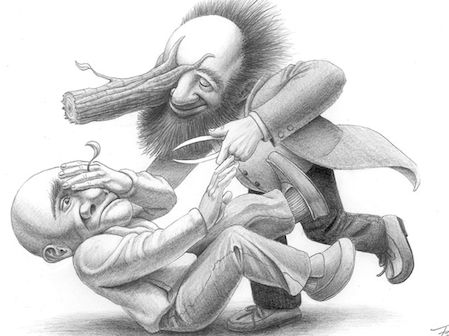Sorry I'm Late
An alcoholic friend of famed author and speaker Philip Yancey was once purported to have said:
When I'm late to church, people turn around and stare at me with frowns of disapproval. I get the clear message that I m not as responsible as they are.

But when I'm late to AA, the meeting comes to a halt and everyone jumps up to hug and welcome me. They realize that my lateness may be a sign that I almost didn t make it. When I show up, it proves that my desperate need for them won out over my desperate need for alcohol.
If AA can get this right, shouldn't we, as the Church, all the more get it right?
Let's focus on each other's victories, rather than shaming and guilting each other for our failures (whether real or presumed).
"Let us think of ways to motivate one another to acts of love and good works" and faithfulness, and perseverance, and obedience, and ... (Hebrews 10:24, NLT).
"Let no corrupting talk come out of your mouths, but only such as is good for building up, as fits the occasion, that it may give grace to those who hear" (Ephesians 4:29, ESV).
Grace Sufficient for a Serial Killer
To the thief on the cross Jesus said,"Today you will be with me in paradise."
That's grace. All that thief had was a prayer, but that's all it took. He had no time to be baptized, or do good works, or turn over a new leaf. He was on a cross dying. That's grace.
Most people celebrate the forgiveness of the thief on the cross, but how about Jeffery Dahmer? He was a serial killer. The Milwaukee Monster was convicted of 17 murders. Eleven corpses were found in his apartment. He dismembered them. He consumed them. He was sentenced to life without parole.

A few months before an inmate murdered him, Jeffrey Dahmer became a Christian. He repented and said he was sorry, profoundly sorry for his sins. He was baptized in the prison. He began reading the Bible and attending chapel. His conversion was genuine. His sins were washed. His soul was saved. His past was forgiven, and that bothers some people.
As Max Lucado expresses the hearts of many, "God is kind, but He's no wimp. Grace is for average sinners like me, not deviants like [him].”
Can Grace really extend to the worst of us? What about people in the Bible? Abraham lied, but he is in heaven. Mosss murdered, but he's in heaven. David was an adulterer, but he's in heaven. Paul arrested Christians and had them killed, but he's in heaven.
The thief on the cross is in heaven, and so is Jeffery Dahmer.
Rather than being bothered by Grace being extended to the worst, we should marvel at the magnitude of God's love.
If they can be forgiven, we can be forgiven. Whatever you've done, you can be forgiven. Nothing is beyond God's grace, because His grace is greater than all our sin. Learn from the thief on the cross. Forgiveness is just a prayer away.
"Then he said, 'Jesus, remember me when you come into your kingdom.' Jesus answered him, 'Truly I tell you, today you will be with me in paradise'” (Luke 23:42-43, NIV).
Speck Inspection
Most of us learn pretty early on that in a conflict, getting those feelings of hurt and disappointment out there is more likely to end a relationship than to fix it. But if honesty chases a friend or a partner away, isn't that for the best?
This would be a good time to remember that Jesus said that being honest with others about their faults is like focusing on a “speck” while ignoring the "log" in our own eye.
That's because when we see a fault in someone else, what we can't see is their true motive or what they've been through to cause them to behave that way. By contrast, we know all of these things about ourselves.
As a result, we are in a much better position to see and address our own faults. They are like a log compared to what we can see in someone else.

Because we are all sinful by nature, we operate from an egocentric perspective. The result is that our relationships suffer not so much from poor communication as from the wrong focus in our communication.
But what would happen if we approached relationship problems with a focus on fixing ourselves, first? What if we refused to address the specks in the eyes of others until we had thoroughly dealt with our dysfunctional behavior? Is it possible that others might be more open to what we have to say about their faults if we admitted our own and did something about them?
"You hypocrite, first take the plank out of your own eye, and then you will see clearly to remove the speck from your brother's eye" (Matthew 7:5).